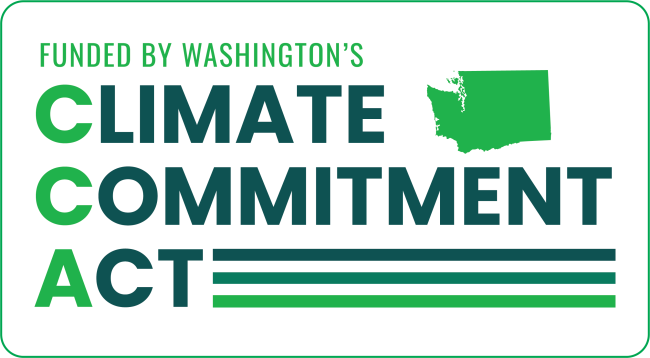Port Electrification Grant
Capital improvement grants for ports across the state to undertake projects that will reduce carbon emissions.
Port Electrification Program
This is a competitive grant program that is available to all public port districts in the state of Washington. It is intended to fund either smaller projects or a small part of a larger project, where state funds would enable the project to be completed.
This grant program is supported with funding from Washington’s Climate Commitment Act. The CCA supports Washington’s climate action efforts by putting cap-and-invest dollars to work reducing climate pollution, creating jobs, and improving public health. Information about the CCA is available at www.climate.wa.gov.

Grant details
For the 2023-2025 biennium, the Legislature allocated a total of $26.5 million for Port Electrification grants from the state’s Carbon Emissions Reductions Account. All public port districts were eligible to apply. Eleven port projects were selected for funding in August 2024. These projects collectively plan to reduce their greenhouse gas emissions by more than 140,000 metric tons over the next 10 years.
The grants being funded in 2024 include projects primarily focused on two types of activities:
- Constructing shore power that allows clean electrical power use while at dock rather than onboard combustion engines for ship operations.
- Installing electric vehicle chargers and purchasing electric vehicles, including drayage trucks to move cargo to and from ships at port facilities.
2024 grant recipients
Following a competitive review process, grant awards were presented to:
- Northwest Seaport Alliance ($2.6 million for shore power planning).
- Port of Anacortes ($1.03 million for shore power and zero emission equipment).
- Port of Bellingham ($2.8 million for shore power).
- Port of Benton ($ 2.7 million for shore power).
- Port of Edmonds ($1.5 million for shore power).
- Port of Everett ($4.3 million for shore power, electric trucks and cleaner generators).
- Port of Friday Harbor ($7 million for shore power and electric trucks).
- Port of Kalama ($1.4 million for an electric boat dock).
- Port of Port Angeles ($525,408 for shore power and electric cargo equipment).
- Port of Ridgefield ($1.2 million for electric vehicle chargers).
- Port of Seattle ($1 million for shore power).
Other similar projects funded by the Legislature
The projects identified below were funded directly by the Legislature in the 2023-2025 state transportation budget. They are separate from the competitive grant program outlined above.
- Northwest Seaport Alliance - $6.3 million to fund a zero-emission drayage truck demonstration project
- Northwest Seaport Alliance - $28 million to fund a zero-emission shore power infrastructure project
- Port of Bremerton - $2 million for port electrification
- Port of Anacortes – $2 million for port electrification
- Puyallup Tribe port properties - $20 million for port electrification
- Tacoma Rail - $5 million to fund the replacement of two diesel-electric switcher locomotives with zero emission battery-electric switcher locomotives and to install on-site charging equipment
Involving the community
We met with the Washington Public Ports Association to inform ports about the program and to encourage potential applicants to conduct local community engagement activities as they develop their projects. Community engagement is included in the scoring criteria that will be used when applications are evaluated.
The Climate Commitment Act (CCA) sets investment goals for the allocation of the Carbon Emissions Reduction Account: 40% of total investments are to provide direct and meaningful benefits to vulnerable populations within the boundaries of overburdened communities (as defined within the CCA), and at least 10% of total investments are to be used for projects formally supported by a tribal resolution. The scoring criteria used for evaluating applications considered whether the project provides benefits to vulnerable populations within overburdened communities, as well as whether it is supported by a tribal resolution.
How these projects will benefit Washington residents
Projects will be evaluated based on demonstration that they will benefit the state’s interests. Examples of desired benefits include:
- Enhancing environmental protection and reducing emissions
- Supporting Washington state’s Environmental Justice and Climate Commitment Act objectives
- Increasing economic development opportunities
- Increasing domestic and international trade
- Preserving or adding jobs
- Enhancing safety
Slow down on ice and snow.
It's easier to skid or lose control traveling at higher speeds. Give yourself more time to stop.
Carry chains, practice installing them.
Winter conditions could mean chains are required on your route. Practice putting them on your vehicle ahead of time.
Pack your winter car kit.
Carry extra supplies like warm clothing, ice scraper and brush, jumper cables and other emergency items.
